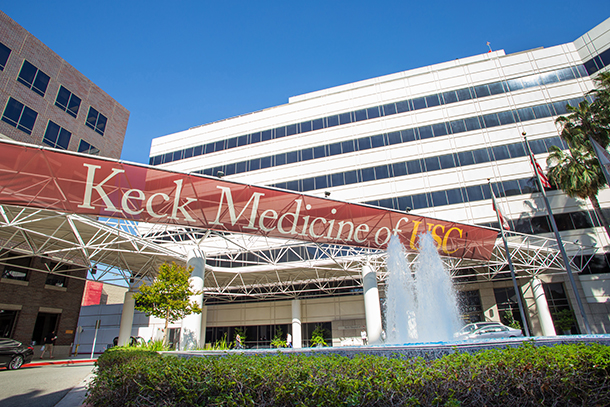Courtney Voelker, MD, director of neurotology in the USC Caruso Department of Otolaryngology – Head and Neck Surgery at Keck Medicine of USC, traveled to Bolivia in 2015. It was during that trip, operating at 12,000 feet, that she witnessed the repercussions of the lack of access to health care for those suffering from ear disease and felt that she needed to improve the situation.
As a result of the Bolivia trip and the impact it made on her, Voelker partnered with Richard Wagner, MD, director of Global ENT Outreach and a member of the Keck School of Medicine of USC’s Class of 1983 with 20 years of international work in the field of ear disease. The clinicians partnered to open the doors of the John Niparko Temporal Bone Lab at the Keck School to foreign doctors and train them in ear surgery.
In February, the first international temporal bone course was conducted with doctors from India, Ecuador, Dominican Republic, Paraguay, Uruguay, Argentina, Trinidad and Tobago, Egypt and Guatemala. The course was taught in both English and Spanish.
The goal of the course was to bring the doctors to a state-of-the-art temporal bone laboratory and train them in ear anatomy, as well as basic surgical procedures that are required to perform safe and successful ear surgery. The doctors were exposed to 10 hours of didactic lectures and 12 hours of laboratory training, where the doctors drill and performed procedures on cadaver specimens. The techniques of cochlear implantation were taught with the support and hands-on expertise from representatives of cochlear implant companies.
On a global scale, around half a billion people suffer from disabling hearing loss. Each year, well over 50,000 children under the age of 5 die from ear disease as a result of complications, like meningitis and brain abscesses. Populations from developing countries are most at risk of becoming societal outcasts due to the hidden disability of ear disease. Unlike those with blindness, hard of hearing or deaf individuals rarely are able to be identified as being deaf.
What makes the international ear course so important, Wagner explained, is that in developing countries there is a higher percentage of the population, compared to the developed world, that suffers from ear disease due to myriad factors, from lack of immunizations, substandard housing conditions, malnutrition, lack of prenatal maternal care and ultimately a shortage of adequately trained specialist in ear disease and surgical care.
Under the directorship of John Oghalai, MD, chair and professor of otolaryngology – head and neck surgery, the USC Caruso Department of Otolaryngology – Head and Neck Surgery is reaching out to otolaryngologists around the world who have interest in ear disease and wish to improve their skills and knowledge. This outreach will help to stabilize ear disease in some, restore hearing in others and save the lives of those at risk of dying from the terrible complications inherent to ear pathology.
The 2nd International Temporal Bone Course will be held in the summer. Those interested in attending should contract info@geoutreach.org.


